"When the Jewish Priest Reached Out to Me, a Stunning Revelation Emerged" - The Jew Close to the Priest Speaks
Yaakov Tzvi Gruner was only 8 when the Nazis invaded Poland, thrusting his life into danger. After his family was murdered, he escaped to a church, where he grew up and eventually became a priest. This week, he passed away, leaving one request: "To be buried as a Jew." Rabbi Shalom Malul, who was close to him in recent years, reveals his poignant story.
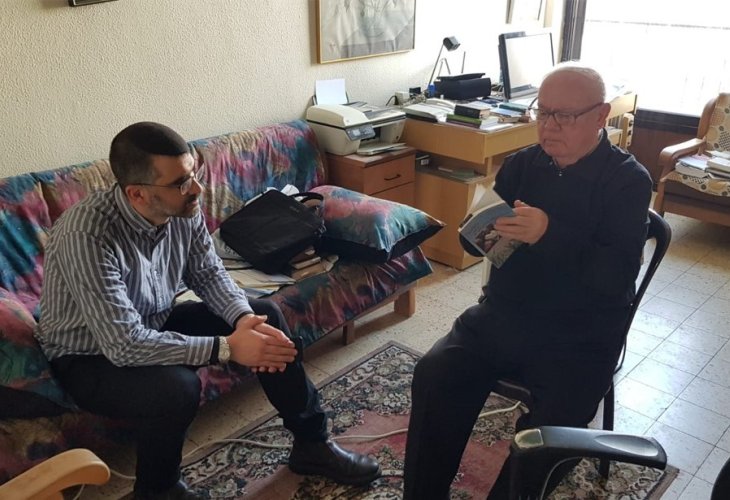 (Photo: Rabbi Elad Portal)
(Photo: Rabbi Elad Portal)This coming Tuesday, a surreal scene is set to unfold at Ben-Gurion Airport - Rabbi Shalom Malul, head of the Amit Ashdod Yeshiva High School, along with six graduates of the yeshiva, will board a flight to Poland to accompany the last journey of the so-called "Jewish Priest."
The story of the priest was published this past weekend. Although many knew him while he was alive, his story gained chilling significance at his passing. It is the narrative of a young boy whose joyful life was shattered at the age of eight, with the Nazi invasion of Poland. From that day, he had to fight for his life until he found shelter in a Christian church, where his life was spared.
For decades, he served as a priest in Jaffa, but all the while he had one request - to be buried as a Jew. Now, as his wish is about to be realized, we spoke with Rabbi Shalom Malul, who was close to him in recent years, to hear the story firsthand and understand what truly occurred behind this extraordinary situation.
The Priest's Story
Rabbi Malul, head of the Amit Ashdod Yeshiva High School, has been working in education for 22 years with a great love. "Over the years I have been exposed to the stories of journeys to Poland," he says. "I took a course for Polish tour guides and have already led about 30 trips. Recently, I started leading trips to Ukraine and Hungary as well, all centered around the Jewish story, with an emphasis on the Holocaust and its consequences."
Rabbi Malul emphasizes that his goal on all these trips is to remember the past while focusing on faith and our connection to Judaism. "In these trips, I strive to introduce the youth to as many survivors as possible, creating a dual benefit - the youth hear inspirational stories first-hand, and we continue to support these wonderful people, celebrating birthdays with them and maintaining connections. It is a great privilege, especially when we manage to take them with us on these journeys, which is the most powerful experience."
As part of his involvement in trips to Poland, Rabbi Malul had the chance to meet Father Gregor Pavlovsky and learn his turbulent life story. "The first time I heard about him was about four years ago," he shares. "I heard from a fellow guide in Poland that they were in contact with him and even tried to discuss his past. That friend warned me that the priest refused to open up and was not interested in discussing his Jewish connection. But apparently, I arrived at a stage where he was more willing to share and talk. I visited his home, and we had a calm, even joyful conversation about Judaism. It was stunning and moving."
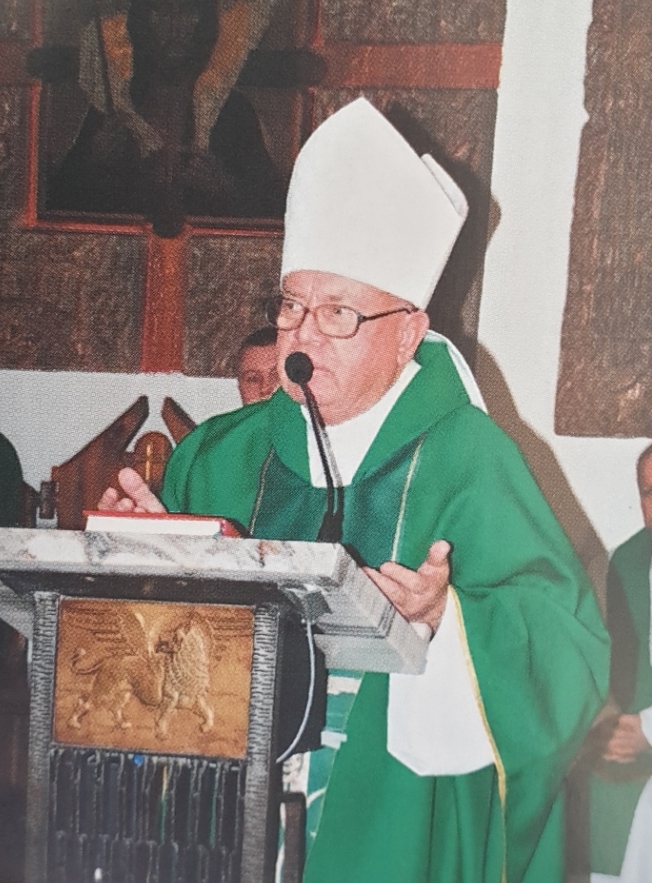 (Photo: Rabbi Elad Portal)
(Photo: Rabbi Elad Portal)Did he tell you his life story?
"Yes, he shared every detail with me. We spoke in Hebrew, which he knew fairly well, although it was clear he was not a native. He was very lucid and even told me he was working on his next book."
As Rabbi Malul details the priest's life story, it is clear he cannot forget any part of it. "He was born into a religious family in Poland, in the city of Zamosc, as Yaakov Tzvi (Hersch) Gruner, the youngest of Mendel and Miriam’s four children. During the Holocaust, he lost his father while in the ghetto, then moved to the town of Izbica, where the Germans concentrated Jews on their way to extermination camps. They didn't stop there; they set up shooting pits in a Jewish cemetery and massacred Jews at the edge of the pits. Yaakov Tzvi managed to escape from the Germans, taking advantage of a momentary distraction, and thus fled. He wandered the roads, searching for a place to hide. The Poles offered some help, but they were very afraid of the Nazis, so they couldn't save him. His safe haven eventually turned out to be the church, where he connected with Christians under a new identity - as Gregor Podlowski.
"With this identity," Rabbi Malul continues, "Yaakov Tzvi lived a double life, feeling Jewish at heart but knowing his entire family was murdered, leaving the church as the only safe place. Thus, he grew up there and even pursued clerical studies. Just before completing his studies and becoming a priest, he mustered the courage to reveal his Jewish identity."
"Yaakov Tzvi told me that at that point, opinions in the church were divided," Rabbi Malul says. "He wasn't, in fact, the first Jew to grow up in the church, and for them, it was seen as a success when Jews converted. But in this case, he had reached a high level, on the way to becoming a priest. There was a debate over whether it was right to allow him to reach such a position. Ultimately, they decided to embrace his story and grant him the title of priest."
The Priest Fasted on Yom Kippur and Ate Matzah on Passover
Rabbi Malul takes a deep breath and continues: "From the moment Yaakov Tzvi revealed his Jewishness, he was not ashamed to speak of it. Thus, in 1966, he wrote an article for the newspaper about his personal story. Coincidentally, the story reached Israel, and then something incredible was discovered - contrary to what Yaakov Tzvi thought, not all of his family perished in the Holocaust; he had a surviving brother living in Haifa, leading a religious life. The brothers, who were unaware of each other's existence, met following the article and decided to erect a monument on the mass grave to commemorate their parents and family."
"Additionally, Yaakov Tzvi made two courageous decisions. First, to immigrate to Israel as a priest and live among the Jewish people. Thus, he left Poland, came to Israel, and received an appointment as a priest in Jaffa. The second decision, as he told me, was: 'I was born a Jew, lived as a Christian, and I want to be buried in Poland as a Jew.' He made his wish clear to his church colleagues and presented the request to the Chief Rabbi of Poland. He even paid for a burial plot in the Polish Jewish cemetery and built a tombstone bearing his name. The peak of this request was when he asked that after he is buried as a Jew, the Kaddish be recited for him."
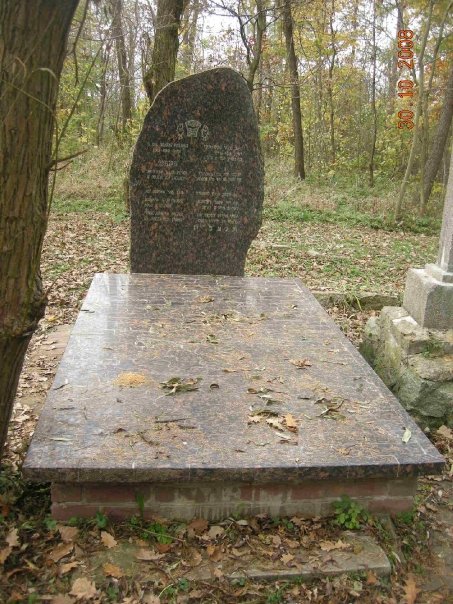 (Photo: Rabbi Elad Portal)
(Photo: Rabbi Elad Portal)"Perhaps it's not clear, but asking for such a request requires extraordinary courage," clarifies Rabbi Malul, "because the Christian church could sever ties with him at that moment, yet he took the risk. Perhaps something in his heart wouldn’t let him remain a priest even after his death, and he always felt a deep connection to Judaism."
In the last few years, Rabbi Malul continued to lead trips to Poland, and each time they passed by the intended grave site for Yaakov Tzvi, he would share his captivating story with the groups. "Every time we passed the site, I would call him, patch him onto the line, and ask him to speak to the Jews now standing over 'his grave.' Each time, he would recount with great excitement, 'You are now standing by the grave where I will be buried after my death as a Jew.' It was very moving to hear his last request, repeated time and again. That was his testament - burial in a Jewish cemetery and Kaddish."
Concurrently, Rabbi Malul continued to visit Yaakov Tzvi and heard stunning things from him. "He told me that he fasted on Yom Kippur and didn't eat leavened bread on Passover. I reacted with great astonishment. I told him, 'You amaze me, soon you'll be a completely kosher Jew...' Then I made a bold proposal: 'Come back to Judaism now. Why wait for the day of death?' He heard this and smiled, then explained to me that he has a great appreciation for the church and couldn't take such a step now. Subsequently, I mustered more courage and proposed he put up a mezuzah at his home entrance. He was very moved and asked me, 'Do Jews need a mezuzah?' I told him, 'Of course.' And he gave his consent."
At the next meeting, Rabbi Malul brought a distinguished mezuzah. "I asked Yaakov Tzvi if he wanted to bless and place it himself, and he agreed," he surprises, "then I took my kippah and placed it on his head, saying the blessing word by word. Thus, he blessed and placed the mezuzah. He was very emotional at that moment. Personally, I felt he had done something else to connect himself to the Jewish people, to whom he felt such a strong connection."
All of this occurred about two years ago, and then the pandemic struck, turning meetings between Rabbi Malul and his elderly friend into phone calls only. "We talked regularly on the phone, asking about his well-being and hoping everything was alright. In recent months, his health was not good, and our last conversation was during the Rosh Hashanah period when I wished him a good year."
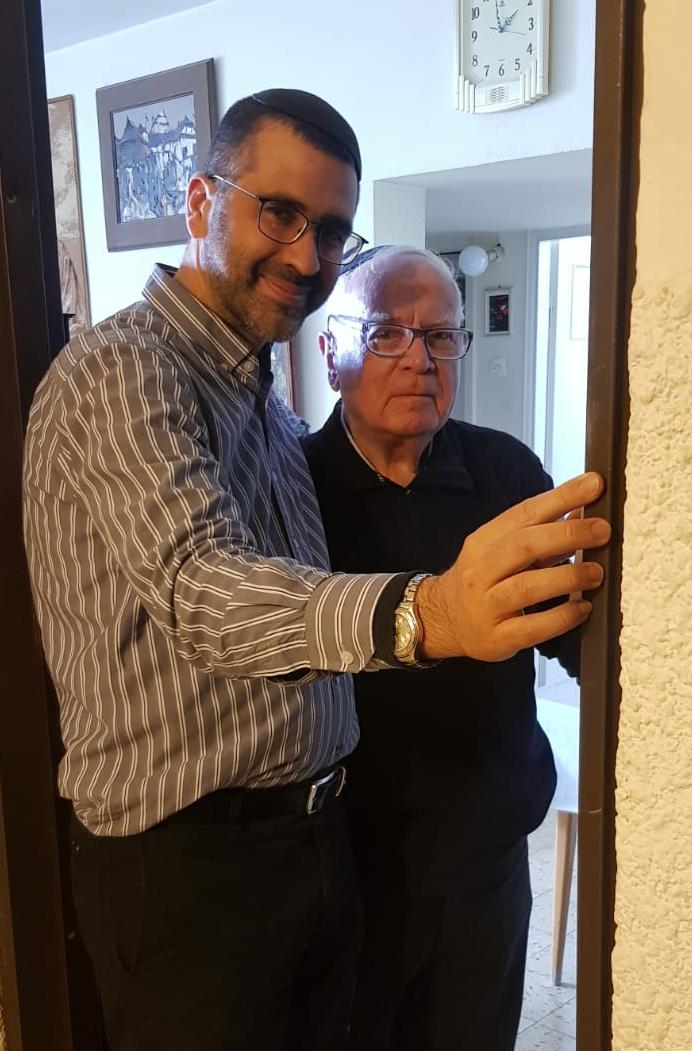 (Photo: Rabbi Elad Portal)
(Photo: Rabbi Elad Portal)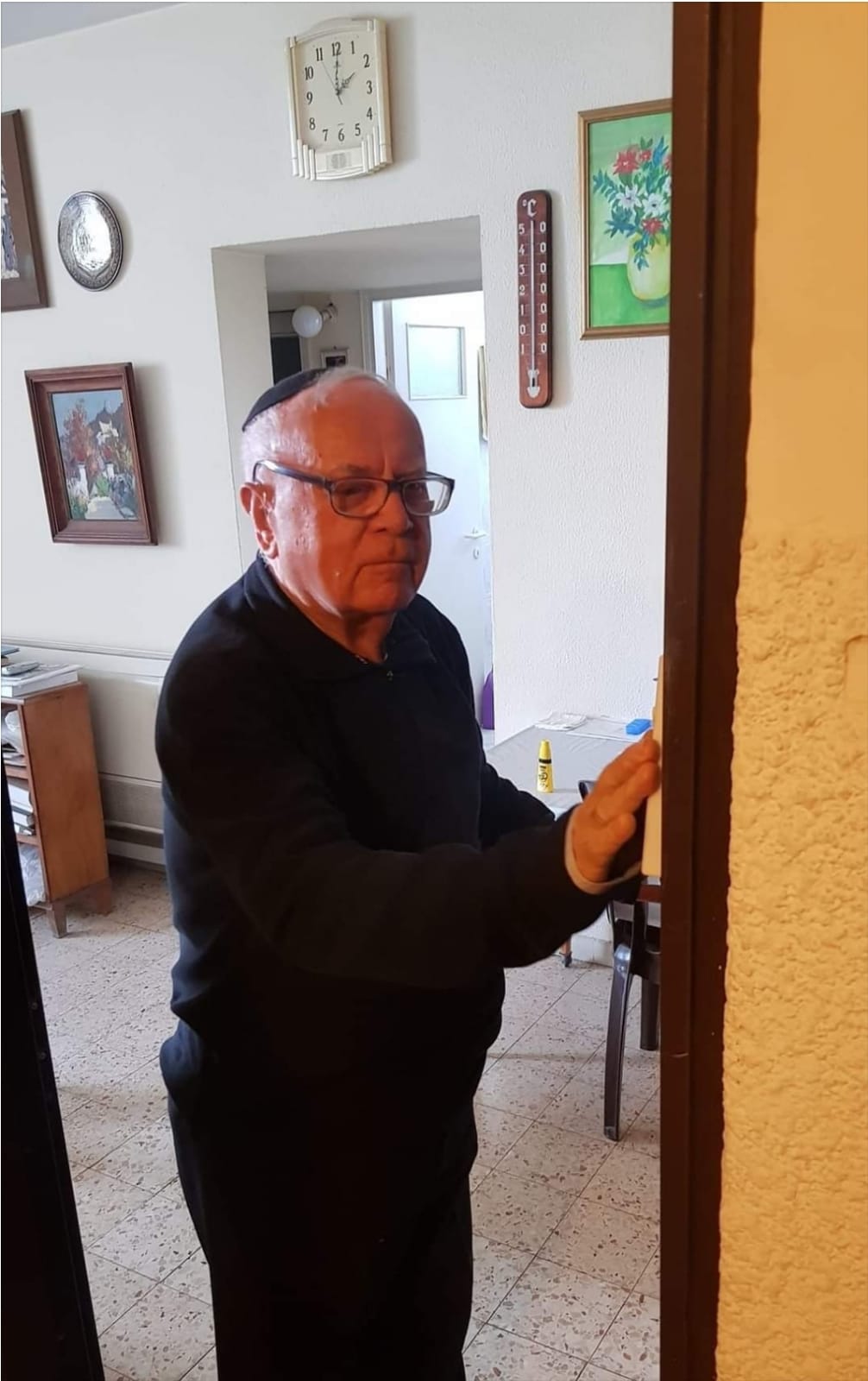 (Photo: Rabbi Elad Portal)
(Photo: Rabbi Elad Portal)A Little of the Light
Rabbi Malul’s voice shakes as he painfully recounts: "I had a dream to bring Yaakov Tzvi to our yeshiva, introduce him to the youth, and host him for Shabbat at my place. Until the last moment, I believed he'd return to Judaism. Before the end, I thought to myself, if he agrees—great, and if not—I’d respect his wish. Unfortunately, we didn’t get that chance, and last week we were informed of his passing."
Nevertheless, Rabbi Malul notes it's impossible not to be moved by the rare and so emotional case. "The priest parted from Christianity and returned to Judaism’s embrace. Indeed, the church held a farewell ceremony for him in Jaffa last week, with another to be held in Poland next week, but immediately after, he will be given a Jewish burial and Kaddish will be recited for him. In doing so, he effectively leaves Christianity behind and returns to the home where he was raised, to the bosom of Judaism."
"I think," he adds after a reflection, "the significance of his act here is immense. It's Jewish heroism par excellence. Although he lived a Christian life, perhaps unable to confront his trial, the mere desire to die and be buried as a Jew has no parallel. For he knew very well that if he were buried as a Christian, he would be honored immensely, with a grave in a designated priestly area, with all the grandeur they can perform. Yet he chose modest Jewish burial in a Jewish cemetery, with Kaddish. That's what he wanted, nothing more."
As the head of a yeshiva, what message do you convey to your students from such a story? On the one hand, it as you mentioned, shows heroism, yet it's a story of a Jew who became a priest...
"That's a good question, but when I speak with my students, I reflect that in a way, it's a story of each one of us. After all, we all have spiritual ups and downs, especially during adolescence, and no, we don't always fight enough for our Jewish identity. And here stands a priest, with enormous strength, facing the church and the whole world, saying to everyone: 'Friends, I was with you only temporarily. Now I return to my inner truth, to my people.' That's the message we need to learn—the extent to which we are obligated to sacrifice for our Judaism. Once, Rabbi Shach zt"l was asked why we bless every morning 'who did not make me a Gentile' instead of 'who made me a Jew.' Rabbi's answer teaches us everything—'Hashem ensures you're not a Gentile, but you make yourself a Jew.' Each of us needs to ask himself what he's truly doing to be a Jew? Are we devoted to this goal? Are we really doing everything required of us?
"And there's another message hidden here—when someone has strayed from the path, we must not alienate him, but love and embrace instead. It's permissible to say we disagree, but never to sever the connection. With love and understanding, we see fruitful outcomes. In this case, we see that the priest lived for two years with a mezuzah at his home entrance. Who knows how many merits that mezuzah recorded for him in heaven? Had I adhered to stereotypes and said: 'He’s a priest and I’m a devout Jew, I won't approach him,’ or even broadcasted open criticism, perhaps we would have only drifted apart. The true acceptance we can give our friends is as Rabbi Elimelech of Lizhensk once said—to see their virtues and not their shortcomings. That's how we need to live as Jews and always remember that a little light dispels much darkness."

